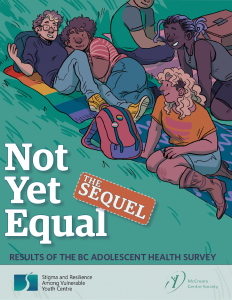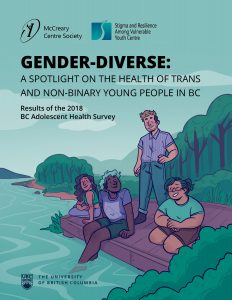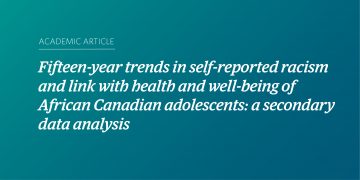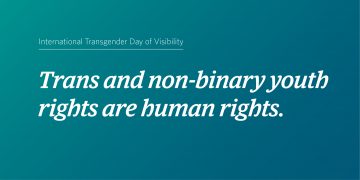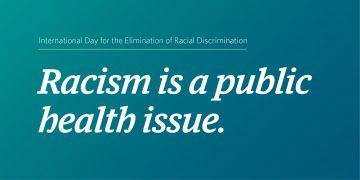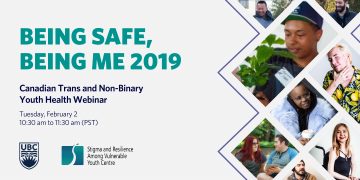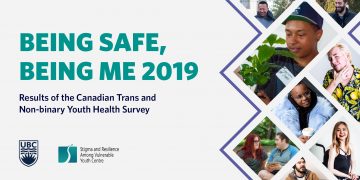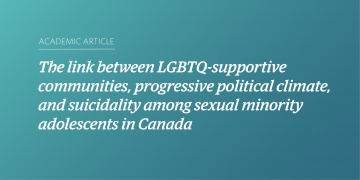Not Yet Equal (the Sequel): Results of the BC Adolescent Health Survey
Not Yet Equal (the Sequel): Results of the BC Adolescent Health Survey provides a profile of the health LGBTQ youth in British Columbia (BC). The report is a collaboration between researchers at SARAVYC and the McCreary Centre Society and uses data from the 2018 BC Adolescent Health Survey (BC AHS), which is one of the […]
Fifteen-year trends in self-reported racism and link with health and well-being of African Canadian adolescents: a secondary data analysis
We assessed the prevalence and trends in racial discrimination among African Canadian adolescents in British Columbia. The association between racial discrimination and self-rated health, access to mental health services, substance use, suicidal thoughts and attempts, experience of extreme stress, among others were examined within the 2018 dataset.
Trans and non-binary youth rights are human rights
International Transgender Day of Visibility is a day to celebrate trans folks and raise awareness about the discrimination and violence that targets them. On Transgender Day of Remembrance, we shared some of the challenges trans and non-binary youth are faced with. Today, we’d like to share some of the ways that trans and non-binary youth feel supported.
Racism is a public health issue
Every day is a day to act towards ending racism, and today is the International Day for the Elimination of Racial Discrimination (IDERD). We condemn racism in all its forms, and especially the anti-Black, anti-Indigenous, and anti-Asian racism and hate crimes that have surfaced throughout the pandemic at the hands of white supremacy. Hateful actions need to stop and white supremacy must be dismantled.
Join us for a webinar and Q&A about the links of provincial policy, IDs, and gender affirming care to trans and non-binary youth health
How is access to gender-congruent ID related to mental health outcomes? Does having a primary care provider increase access to gender affirming care and does this access change depending on the level of comfort towards the primary care provide? What is the link between Canadian provincial health services policy and access to gender affirming care? Join us for a webinar on February 2nd where we discuss the research behind these questions.
Join us for a webinar and live Q&A as we share results from the Canadian Trans & Non-binary Youth Health Survey.
On November 17, we will share some of the key findings from the Canadian Trans & Non-binary Youth Health Survey. Following the presentation, we will answer your questions during a live Q&A session. Please sign up now to claim your spot in the webinar.
The link between LGBTQ-supportive communities, progressive political climate, and suicidality among sexual minority adolescents in Canada
Despite supportive structural changes to reduce stigma towards lesbian, gay, and bisexual, transgender, queer, and questioning (LGBTQ) Canadian residents, sexual minority youth still face disparities compared to heterosexual peers. We aimed to characterize LGBTQ-supportive environments and political climates, and examine their links to suicidal behavior among sexual minority adolescents in western Canada.
Experiences of surgery readiness assessments in British Columbia
This paper foregrounds patient experiences with surgery readiness assessments to discuss the tensions, challenges and opportunities they generate. The narratives demonstrate how much variation exists among people’s experiences of readiness assessments for gender-affirming surgery.
Clinical Issues among Chinese Gay Men in Counseling
In Chinese societies, such as those in Taiwan, Hong Kong, mainland China, Malaysia, and Singapore, same-sex sexual behaviors have been pathologized, resulting in increased minority stress among Chinese gay men (CGM). Therefore, we attempted to understand CGM’s potential clinical issues. Twelve CGM were interviewed and a basic interpretive qualitative methodology was used to analyze the […]
